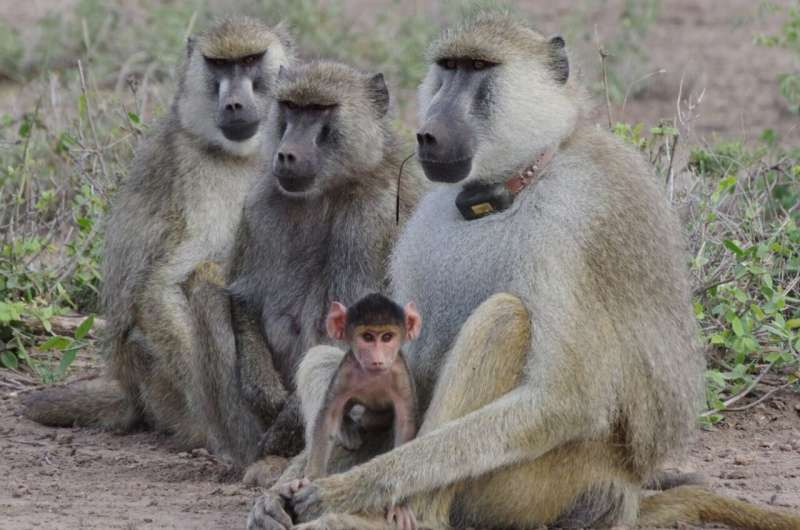In a groundbreaking study, researchers from the University of Notre Dame have discovered that strong father-daughter relationships in baboons can significantly extend the lifespan of female offspring. Published in the Proceedings of the Royal Society B, the study highlights the unexpected benefits of paternal involvement in a species where maternal care is typically predominant.
The research, led by Elizabeth Archie, a professor of biological sciences at Notre Dame, examined 216 female baboons in the Amboseli ecosystem of East Africa. The findings reveal that female baboons with strong early-life relationships with their fathers tend to live two to four years longer than those without such bonds.
Uncovering the Role of Baboon Fathers
Unlike most mammals, where paternal care is rare, male baboons appear to adopt a “dad mode” as they age. According to Archie, “Male baboons tend to reach their peak reproductive success when they’re young adults. But once they’ve had a few kids and their condition declines, they sort of slide into ‘dad mode,’ where they don’t disperse as much and they don’t try as hard to mate. Then they have time to invest in and hang out with their kids.”
The study found that about one-third of the daughters lived in the same social group as their fathers for three years or more, while the rest had fathers who either left or died within their first three years of life. This co-residence appears to be a critical factor in the daughters’ longevity.
The Importance of Grooming and Social Bonds
Grooming, a behavior used for hygiene and social bonding, was also evaluated. Archie noted that grooming could be considered the “human equivalent of sitting down, having a cup of coffee and a good chat.” The research showed that daughters with strong grooming relationships with their fathers lived longer than those without.
“Early life adversity has a powerful effect on lifespan, so this study suggests that having a dad allows females that have experienced other forms of adversity to recover some of those costs,” Archie explained.
The study also found that strong relationships between juvenile females and other adult males did not predict adult survival. This might be due to the protective role fathers play, sometimes intervening in conflicts to protect their daughters and even their mothers from other group members.
Implications for Understanding Evolutionary Roots
The findings provide new insights into the evolutionary roots of parental care in mammals. Although male baboons may not contribute significantly to offspring care, their presence and interactions have important consequences for their daughters’ survival.
This research is part of the Amboseli Baboon Research Project, one of the longest-running primate studies in the world, co-directed by Archie, Susan Alberts from Duke University, and Jenny Tung at the Max Planck Institute for Evolutionary Anthropology. The study also involved David Jansen from the University of Wisconsin-Madison and J. Kinyua Warutere at Amboseli National Park in Kenya.
David J. Jansen et al, “Early-life paternal relationships predict adult female survival in wild baboons,” Proceedings of the Royal Society B: Biological Sciences (2025). DOI: 10.1098/rspb.2025.0194
As researchers continue to explore the dynamics of baboon social structures, these findings could reshape our understanding of paternal roles in the animal kingdom and offer a window into the evolutionary history of human parental care.
 Father-Daughter Bonds Extend Lifespan in Female Baboons, Study Finds
Father-Daughter Bonds Extend Lifespan in Female Baboons, Study Finds Father-Daughter Bonds Enhance Longevity in Female Baboons, Study Finds
Father-Daughter Bonds Enhance Longevity in Female Baboons, Study Finds Moon Phases Explained: What to Expect on July 6, 2025
Moon Phases Explained: What to Expect on July 6, 2025 Moon Phases Explained: July 6, 2025 Waxing Gibbous Illuminates the Night Sky
Moon Phases Explained: July 6, 2025 Waxing Gibbous Illuminates the Night Sky Mysterious Skull Formation on Canadian Coast Sparks Alien Theories
Mysterious Skull Formation on Canadian Coast Sparks Alien Theories